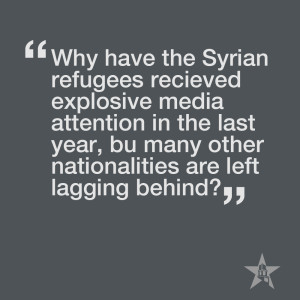While I stand in a circle with other students at Dean Jordan’s daily communion, we launch into the portion that is titled, Prayers for Others. During this time, anyone can say a name or a situation that is on their heart, so that the whole group may offer a prayer with them. As we start off, the prayers are individually specific – “for David, for Lindsey, for my parents, etc.,” but soon the person next to me pipes up, “for the Syrian refugees.” No one looks up in confusion: we have all heard much about the plight of these refugees over the past few months, and we respond emphatically in unison, “Lord, hear our prayer.”
 The UNHCR (The United Nations Refugee Agency, originally “office of UN High Commissioner for Refugees”) estimates that 1 out of every 4 refugees worldwide is Syrian, the largest source of refugees in 2014; previously it had been Afghanistan. While it is certainly fortunate that many prayers and resources have been directed to this country’s peoples, I wonder about the other 3 out of every 4 refugees that aren’t Syrian.
The UNHCR (The United Nations Refugee Agency, originally “office of UN High Commissioner for Refugees”) estimates that 1 out of every 4 refugees worldwide is Syrian, the largest source of refugees in 2014; previously it had been Afghanistan. While it is certainly fortunate that many prayers and resources have been directed to this country’s peoples, I wonder about the other 3 out of every 4 refugees that aren’t Syrian.
Why have the Syrian refugees received explosive media attention in the last year, but many other nationalities are left lagging behind? It troubles me that at Houghton, a place that is internationally-minded, I have never during communion nor morning prayer heard a prayer offered up for these other refugees. I have not heard a chapel prayer that included another specific minority. In the last year, there has been a GCF session to educate us about Syrian refugees, but not about the Rohingya, the Tatars, or the Baloch.
Columbia has over 6 million registered IDPs (Internationally Displaced Persons) in their country, but I don’t know anything about their struggles. Do you remember when South Sudan became a country in 2011? Or when conflict started heating up there again in December of 2013, creating 1.5 million internationally displaced persons that have yet to return home? When did we stop praying collectively for the Sudanese? Or think further back, to the Tibetan protests and subsequent Chinese human rights violations in 2008-2009. Tibet is still a source of refugees, many who go to Nepal and India in search of religious and political freedom. There was a time when I often heard prayers for them, but that time has passed, though the people group still faces persecution.
Have you heard of the Rohingya? They were the subject of some news articles last year, one which states, “According to the UN, they are one of the most persecuted minorities in the world.” The Rohingya are a minority from Myanmar/Burma, who are considered “stateless.” Though they live in Myanmar, they are denied citizenship and so have no identification with which to apply for asylum. Due to hostile welcomes from the governments of neighboring countries, last year in May, there were an estimated 8,000 Rohingya stranded at sea (BBC news). Yet, there haven’t been any pancake dinners at Houghton to raise money for relief efforts to the Rohingya, only for the refugees from Syria.
 Of course, there are many people suffering persecution in the world and it is natural to focus on the Syrians, because they are the nationality with the most refugees. However, it is not fair to single them out while neglecting the fate of millions of other refugees around the world.
Of course, there are many people suffering persecution in the world and it is natural to focus on the Syrians, because they are the nationality with the most refugees. However, it is not fair to single them out while neglecting the fate of millions of other refugees around the world.
Similarly, I don’t think it’s fair during a PRAXIS that is focused on reconciliation to only have African-American speakers highlighted. Racism and ethnic prejudice happen to millions of people in so many different countries around the world. Sure, one of the speakers had a story about a Korean student they counseled, but why didn’t we hear directly from any Koreans? Why were only African-American speakers brought in?
The Kurds have been persecuted in Iraq, Turkey, and Iran because of their ethnicity and are in desperate need of reconciliation. In Russia, minority groups like the Romani and Tatars are continually marginalized and have been for years. In Ukraine, tensions between Ukrainians and Russians have led to war. Yet, only one race was represented during PRAXIS week, though there are millions, if not billions, of people suffering from ethnic prejudices and tension.
These two instances lead me to wonder if it is really true that the people praying for Syrians care at all about refugees. If they really cared about refugees, they would not only pray for Syrians, but also for the many other refugees around the world. Indeed, if they even cared about the Syrian refugees, they would have started praying for them when the Syrian civil war broke out 5 years ago. If the campus really cared about global ethnic reconciliation, they wouldn’t just be talking about the plight of minorities in the USA, and they wouldn’t just have ethnically black speakers. However, over the past couple of years or months, these are two issues that have taken a front-row seat in the American media and become topics of heated debate. But if we really cared about refugees and ethnic reconciliation, we would be praying for and hearing from the multitude of diverse stories from around the world that are not always at the forefront of the media.
Sadly, I find that the Houghton community and general Christian population tends to rely on trending media issues as focal points for sympathy and prayer, rather than consciously working towards broader social justice movements. Unfortunately, the multitude of prayers for Tibet that I once heard have been reduced to just a few, and sadly, in a couple of years, this will probably happen with the Syrian conflict too.
